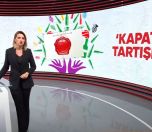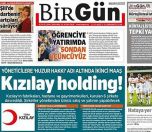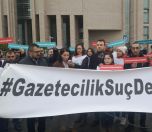Click to read the article in Turkish
Last week, main opposition CHP's Muharrem İnce left a live TV program at Haber Global news channel, which has caused quite a reaction. What led İnce to left the studio in the middle of a live broadcast was that he was interrupted a few times so that the speech of President and ruling AKP Chair Recep Tayyip Erdoğan could be aired.
When we brainstorm for a moment, Erdoğan was not talking about a crisis that evening. There was no natural disaster in the country, nor was there a burning issue or "breaking news"... It was not an election night, either. The society was not breathlessly waiting for a possible statement about what would change in daily life, as it was the case in the days of quarantine. What Erdoğan was talking about that evening was the celebrations for the "conquest" of İstanbul, which is routinely celebrated every year.
The statement of a President can, of course, make news. A President's speech can be broadcast live. Based on their definitions of newsworthiness, it is a practice of TV channels, newspapers and digital news outlets in their daily routine: Depending on the type of the media outlet, the content/ speech/ statement is either broadcast live or reported in the news bulletins or published in the newspaper next day. Given that news websites - by definition - generally do not have worries about time, the issue can be reported during the day if it is important.
However, in recent years, TV channels in Turkey have developed such a reflex that whenever Erdoğan makes a speech, no matter what program is aired at the moment, it is cut and no matter who speaks at the studio, he or she is interrupted so that he can be broadcast live. All news channels do it without any exceptions. It has long been forgotten that it is beyond impoliteness, but disrespect for both the guest at the studio and the audience. In fact, people have long been inured to this. I am sure you also did it at some point: You took the remote control to zap because you were bored, you passed to another channel and to yet another "in astonishment." It is a fruitless endeavour that ends in switching off the TV altogether. At one time, it was even protested on social media, saying "Turn off."
Hosting the same people as "experts" at discussion programs and going live with the same people, which has long been a chronic problem of the mainstream media in Turkey, is again the most visible and complained aspect of the problem. Some figures even put aside their identities as guests and turn into permanent commentators of the channel. As is known, ruling party MPs cannot get on TV by the order of their party chair. Instead, people with the titles of legist, academic or journalist before their names show up on TV. Who knows what kind of an agreement there is between these people, the government and TV channels, but what concerns the public here is that it reveals the univocal broadcasting format.
For instance, there has long been such an understanding of broadcasting in Turkey that the problems of women are discussed without having any women at the studio, children's problems are discussed without their presence and the opposition chairs and MPs debated that night are deprived of an access to the screen, they are not given a say. Thanks to the advancing and diversifying technological means, it is, in fact, possible to get in contact with the people, about whom they talk on live TV for hours. However, instead of doing this, they do not let them speak live even when they necessarily want to do it in line with their right to speak.
Such a practice of "reporting" goes way beyond the years-long debates on the impartiality of the media, it is directly related with equity and, thus, with the notion of ethics. While guests with opposing views - who would usually end up affirming the dominant ideology anyway - used to be invited by the mainstream media in an attempt to prove their most important claim, namely their adherence to the principle of objectivity, now, the issue cannot be explained even in general terms, let alone at length. A constant disinformation and manipulation is flowing from the channels, rather than a one-way flow of information.
As a matter of fact, the opposite cannot have been expected in a place where the government owns the media or leads others to do so. It is inevitable that the media outlets that have become the body of a party, organization or company will turn into tools of advertisement and propaganda; however, what is the case for the traditional media now is not a general censorship, but self-censorship, which is more dangerous. That is why, with the disappearance editorial independence, several people in the mainstream media have either lost their jobs or had to resign. Journalists' room for maneuver has considerably narrowed.
CLICK - Who Controls the Media in Turkey?
There were other incidents in the past when the government interfered in broadcasts, but what happened at Haber Global seems to be rather the interference of media ownership in the broadcast stream or the reflexive situation of "gatekeepers" - as conceptualized by Kurt Lewin in communication sciences. (Left in a difficult situation, program moderator Senem Toluay Ilgaz expressed her sadness in a tweet after the incident.) At that moment, the program might have been hosting İnce or someone else outside politics. What is the matter here is this feeling of being obligated to cut a live program over and over again to broadcast a President speaking somewhere else, say an inauguration ceremony, rally or celebration. When İnce left the studio, it has made the issue more visible, that is all.
When we talk about TV broadcasting, it comes to the issue of freedom of press and expression again. It is not possible to consider audiovisual and printed media separately. While there is the Press Advertisement Institution (BİK) for newspapers, there is the Radio and Television Supreme Council (RTÜK) for TVs. While the duty of the former is to distribute public ads among local and national newspapers fairly, that of the latter is to inspect radio and television broadcasts. They are "autonomous" institutions. But they are so autonomous that they have turned into direct tools or sticks for the government to exert pressure on the media that it finds disturbing.
In May, the BİA Media Monitoring Report listed the violations faced by the media in Turkey one by one. The report says that the public ad cuts imposed on daily Evrensel by the BİK still continue.
In the recent period, the fines and broadcast suspensions imposed on different media outlets by the RTÜK and the public ad cuts of the BİK is the most striking issue in the context of media freedom. While the broadcast of "Sözüm Var" (I have a word) program on Halk TV has been suspended for five times, the public ads of Cumhuriyet have been cut for 35 days over a news report regarding a construction built by Presidential Communications Director Fahrettin Altun in an area near his villa. The ads of BirGün have also been cut for seven days over two news reports about Turkish Red Crescent.
While fines over fines are imposed on press institutions due to their journalistic activities, while this period is marked by the arbitrariness about yellow (turquoise) press cards and while journalists are imprisoned... Presidential Communications Director Altun said the following about the police violence faced by the state channel TRT World team in the US:
- Press freedom is the backbone of democracy!
So long as you do not report on how these estates are rented or they have been demolished because they were illegal... (Let us remind you that daily Cumhuriyet's Hazal Ocak, who reported the news in question, is now facing a suit for damages and terror investigation.)
So long as the issue of religious sects is not addressed in reporting on ominous affairs in tenders of charitable organizations (Red Crescent)...
So long as you do not question why the Presidency of Religious Affairs let 20,000 people to go to Umrah, knowing the coronavirus risk...
So long as your guest at your program does not refer to a change of government...
The list can go on and on... But, for now, let us content ourselves with writing that Turkey ranks 154th among 180 countries in the World Press Freedom Index of the Reporters Without Borders (RSF).
Press is the life savior for democracy, but - in the most innocent terms possible - some need to reconsider the notion of democracy independently from the positions they hold, I suppose. (SE/AÖ/SD)









